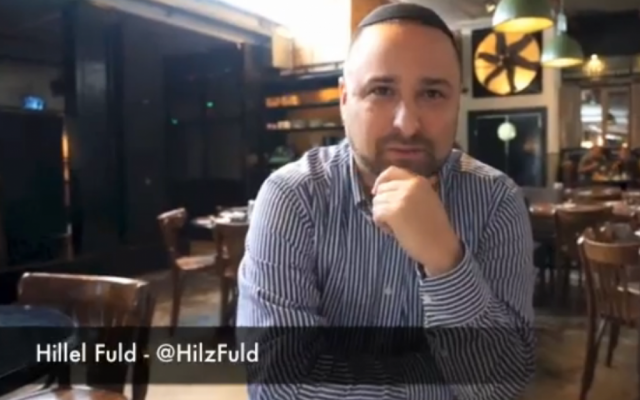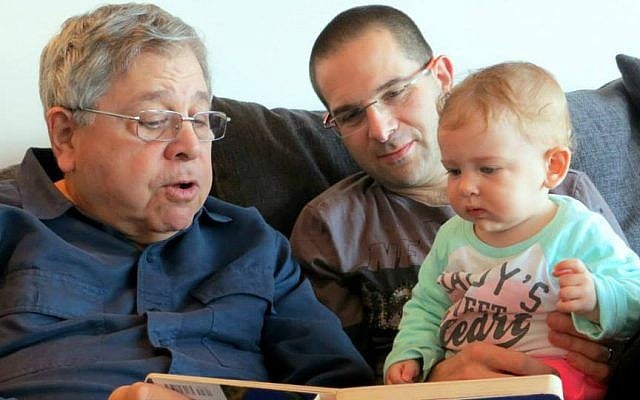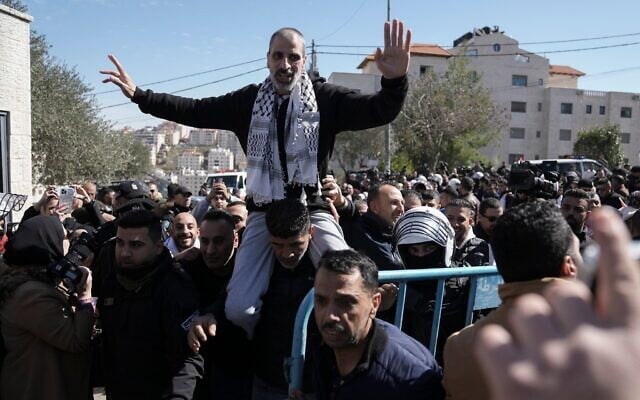



For Hillel Fuld, watching Israeli hostages returning home from Gaza has been a challenging experience.
It’s not that he isn’t moved by the emotional reunions of the freed captives with their families. Rather, it’s because his brother’s murderer is among hundreds of Palestinian prisoners earmarked for release in exchange for the Israeli captives.
“It’s like a punch in the gut,” said Fuld, a high-tech consultant and social media influencer from Beit Shemesh, speaking to AFP.
“On the one hand, we’re releasing hundreds of monsters for every single Israeli hostage. It’s just tragic, it’s horrible,” he said.
“On the other hand, we see these hostages being reunited with their families. How could we not pay that price?” he asked.
“Who could look a mother in the face and say we’re not going to bring your daughter back from the dungeons of hell?”
Fuld’s elder brother, Ari, was stabbed to death by a Palestinian teenager in the West Bank in 2018.
Like other Israelis, Fuld has been watching hostage-prisoner exchanges for weeks as Israel and Hamas implement the first phase of a ceasefire deal.
Since the truce took effect on January 19, more than 15 months of fighting in Gaza has largely halted.
Hamas has released 25 living hostages in exchange for more than 1,100 Palestinian prisoners.
In the latest swap on Saturday, however, Israel suspended its planned release of more than 600 prisoners after the terrorists had already freed six hostages.
Among those due for release was Khalil Yousef Ali Jibrin, who was 17 when he fatally stabbed Ari Fuld.
Security cameras captured the attack, showing Jibrin stabbing Fuld in the back.
Ari Fuld, a US-born Israeli, chased Jibrin and shot him before succumbing to his own wounds.
Jibrin, who was treated by paramedics, was later sentenced to life in prison by an Israeli military court.
On Saturday, he had been due to be taken to his hometown of Yatta in the southern West Bank until Prime Minister Benjamin Netanyahu halted the releases at the last minute.
Netanyahu said the suspension would remain in place until Hamas stopped holding “humiliating” ceremonies for the release of Israeli hostages.
Still, Hillel Fuld remains shaken by the thought of his brother’s murderer walking free.
“It’s mind-boggling to me,” he said.
“It hurts on a personal level, but on a national, theological level, as an observant Jew, we have to do it… We’ve got to bring our people back.”
Israel faced a similar dilemma in 2011.
Back then, Hamas secured the release of more than 1,000 Palestinian prisoners — including Yahya Sinwar, a key architect of the 2023 attack that sparked the Gaza war — in exchange for Israeli soldier Gilad Shalit.
“It’s a horrible feeling both on a personal level… I mean it’s just dramatic and it’s unjust but it’s even a more horrible feeling on a national level to see this going on,” Tel Aviv resident Micah Avni said.
Avni’s father, Richard Lakin, a school teacher and peace activist, was murdered by Palestinian terrorists in a 2015 stabbing and shooting attack on a Jerusalem bus.
His father’s killer, Bilal Abu Gaanam, was also on Saturday’s list of Palestinian prisoners to be freed.
Abu Gaanam, who was sentenced to three life terms for killing Lakin and two others, was among 108 Palestinian prisoners to be deported abroad.
“I knew it would happen,” Avni said, recalling the Shalit deal.
“After my father was murdered and the terrorist was tried, I looked at my sister and we knew it was just a matter of time until another deal would happen and the terrorist would be let out,” he said.
“Of course, I thank God that these people’s lives were saved,” Avni added, referring to the recent release of Israeli hostages.
“But it’s a national tragedy.”
Both Avni and Fuld believe that to prevent such situations in the future, Israel should adopt a “shoot-to-kill policy” and, if an attacker survives, implement the death penalty.
“The only place for a terrorist who’s murdered someone is death,” said Avni, whose father was an educator and peace activist.
“Whether it’s a terrorist who murdered my father or somebody else’s father, letting them go means there’s a high chance they’ll kill somebody else,” he said.
“That, somehow, makes me an accomplice to the next murder. It’s a horrible thing.”



